Wanted! Stagiaire programmation
- Compétences en programmation
- Expérience avec Unity
- Expérience avec les outils de GUI de Unity est un plus
- Bonne communication
- Autonomie
Oh Wondrous day! All our games, Squids, Squids Wild West and Combo Crew are FREE today on the App Store, and Squids is also free on Google Play. Time to stretch some tentacles and punch a few faces. Possibly even punch with a tentacle.
Squids: https://itunes.apple.com/us/app/squids/id467904350?mt=8
Squid Wild West: https://itunes.apple.com/us/app/squids-wild-west/id522145076?mt=8
Combo Crew: https://itunes.apple.com/us/app/combo-crew/id599516631?mt=8
Squids – Google Play: https://play.google.com/store/apps/details?id=com.thegamebakers.squids20HD&hl=en
English below.
Nous recherchons un profil technique artistique (graphiste ou programmeur) pour la partie VFX et shader de notre prochain jeu consoles/pc sur Unity.
Missions :
Expérience :
Dates : Mission avril – septembre
Lieu : A distance ou à Montpellier
Rémunération : Selon expérience. C’est une mission freelance
Pour postuler : Book et un petit mot à hello@thegamebakers.com
———————
We are looking for a technical/artistic profile (artist or programmer) to create the VFX and shaders for our next consoles/pc game on Unity.
Missions:
Experience:
Dates: Mission april – september
Location: Remote work or in Montpellier (France)
Salary: Based on experience. It’s a freelance mission
To apply: Samples of your work and a short note to hello@thegamebakers.com
[ANNONCE FERMEE – POSTE POURVU]
Nous recherchons un stagiaire en game design, pour du balancing et de l’intégration sur notre prochain jeu consoles/pc.
Mission :
Game design balancing et integration pour jeu de type beat’em all :
Expérience requise :
Compétences souhaitées :
Dates : Avril à Novembre – stage de 6 mois minimum (plus souhaité) ou alternance
Lieu du stage : Montpellier
Rémunération : 508€/mois
Pour postuler : CV / book et un petit mot à hello@thegamebakers.com
We haven’t said much about our next game, apart from the fact that it’s console / PC and that it’s a third person action / adventure game. But we are looking for some talents to join our team. Below you will find more info on the missions. If you are interested, send us a mail and portfolio at hello at thegamebakers dotcom.
You will be in charge of the 3D animations of the characters for the cut-scenes and scripted events of the game.
[ANNONCE FERMEE – POSTE POURVU]
You will be in charge of developing gameplay, tools and AI systems on a third person action game using Unity engine.
SQUIDS was our first game as The Game Bakers, and since its initial release on iOS in 2011, it has lived a good life. It was ported to other platforms (Android and Windows Phone, PC, Mac), had a critically-acclaimed sequel (SQUIDS Wild West, 87% average on Metacritic), and was recently released on Wii U and 3DS in the form of SQUIDS Odyssey, which compiles the first two SQUIDS games with a new chapter and a lot of bonus content.
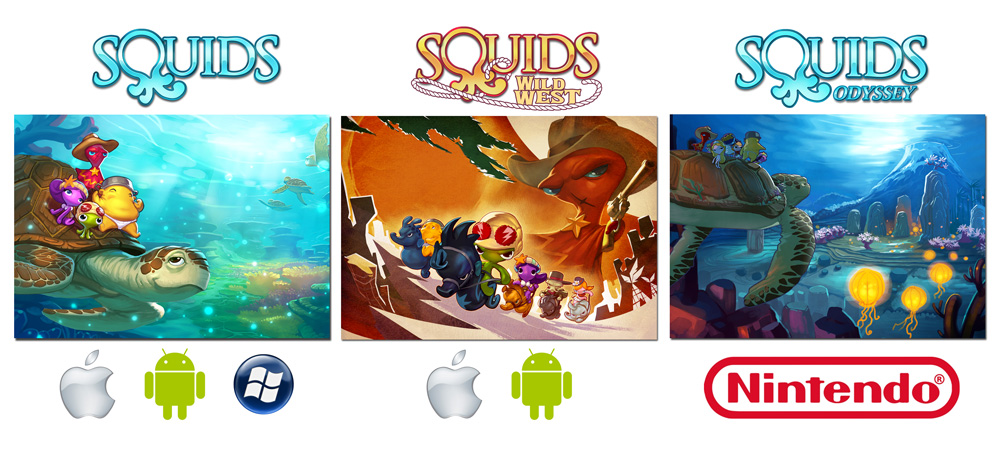
I’ve already discussed the business and financial side of the game in a previous article, and in another one, the fact that the game was developed « in the clouds » with team members all over the world. Now that SQUIDS Odyssey is generating new interest in the franchise, I want to delve into why and how we made some our design decisions, when we first conceived SQUIDS.
Like most ideas at The Game Bakers, SQUIDS was born at the diner table. The Game Baker’s co-founder Audrey Leprince and I were discussing our mutual passion for octopus, squid and calamari, and what incredible creatures they are. (Not only because they’re tasty!) After a few glasses of wine, we started having fun with the idea of a game called « Assassin’s Squid ». It was a good pun but normally this wouldn’t have been a conversation I’d still be thinking about the next morning. This time, though, the idea stuck in my head for a reason I couldn’t identify at the time.
I had been trying to come up with a new game idea for a while. I knew what game mechanics I wanted to have, but I hadn’t found the framework for them. I knew it would be a tactical game with “team management” and at least one real time action challenge, like aiming.
We often pitch Squids as « Final Fantasy Tactics meets Angry Birds », because it’s easier for people to understand, but the true initial references for Squids are Shining Force and Cannon Fodder: Shining Force for its great character design and T-RPG mechanics, and Cannon Fodder for the team-based tactical action.
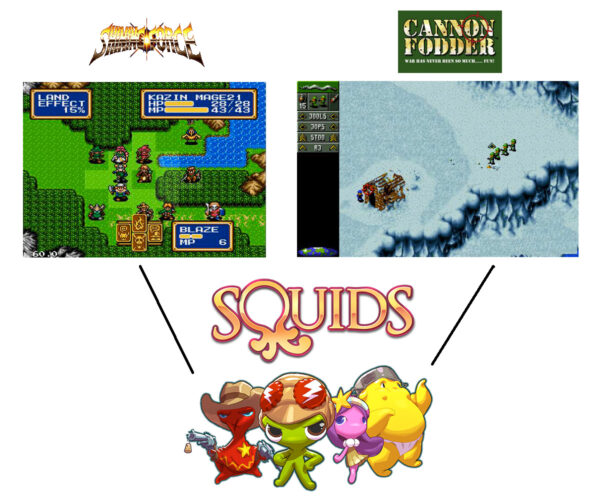
I already knew how I wanted the game to work on a tactical standpoint, but I wasn’t happy with controls like “tap to move”. I wanted the game to work with a gamepad (I already had a console version in mind), but most of all, I wanted great touch controls. Touch devices require controls to be designed for them, with gestures in mind. With tactile devices you slide, you swipe, you pinch, you spread… all these interactions are what make touch devices interesting. Buttons are great on a controller, but not on a screen.
Therefore, with my tactical game in mind, I wasn’t happy with my « tap to move » controls. That’s why the Squid shape stuck in my mind: they have tentacles.
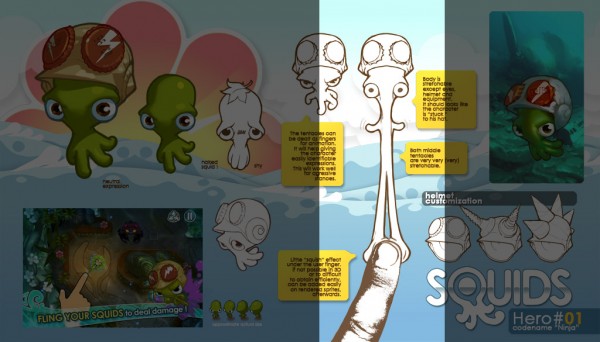
Pulling tentacles, aiming, throwing, managing strengths, bounces… Squids brought with them a whole world of game mechanics to add on to a rather niche genre, the T-RPG. With SQUIDS, we were deliberately aiming for a casual game—deeper than Doodle Jump, but not as complex as Final Fantasy Tactics. Linking the shape of the character to the controls is the greatest way to achieve accessibility, and it worked: even kids immediately understood how to play.
From there, I knew I had the pillars of the game (as you can see in this slide from the original creative overview presentation):
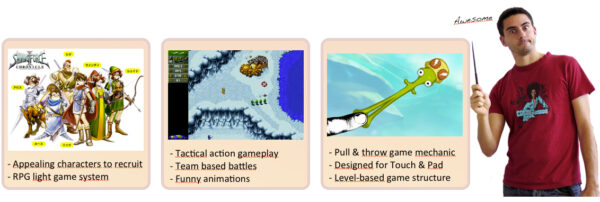
SQUIDS is a game that looks simple on the surface, but it actually has a lot of features. An awful lot compared to the average iOS game. One of these features is the « helmet system », which ended up being a little different from what you could have expected.
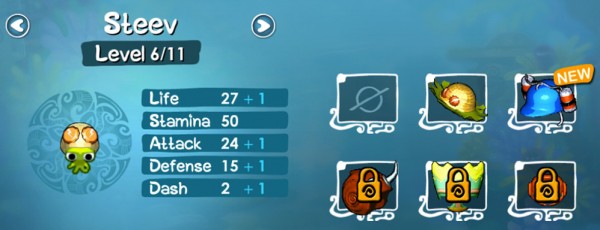
Some of the classic features you can expect from a tactical RPG are equipment (weapons, armors, scrolls, etc.) and aesthetic customization. I wanted Squids to be casual-friendly—not to scare players with a lot of menus and UI—so I decided to merge these two features in one. Our Squids fight with their heads when you throw them at the enemies—why not give them some helmets? The helmets were going to be the weapons as well as the accessories to customize your characters.
The reflex design for this is to assign bonus stats to each helmet. The early ones would be weaker than the final, golden-legendary ones. That’s how it works in all RPGs: the wooden stick gives +1, the diamond sword +52. The downside from a customization standpoint is that even if the player prefers the look of the first helmet, they would still end up equipping the later one because it has better bonus stats—goodbye customization. A downside for us, the developer, is that we’d spend days to design, model, export sprites, fix sprites, and integrate the new helmet into the game, for only a few minutes of play before the player found a better helmet and dropped the first one forever.
That would be a shame, because I love our little helmets. They’re all interesting, they carry a lot of the game’s identity, and I wanted players to be able to choose whatever helmet they wanted without losing the benefits of better stats.
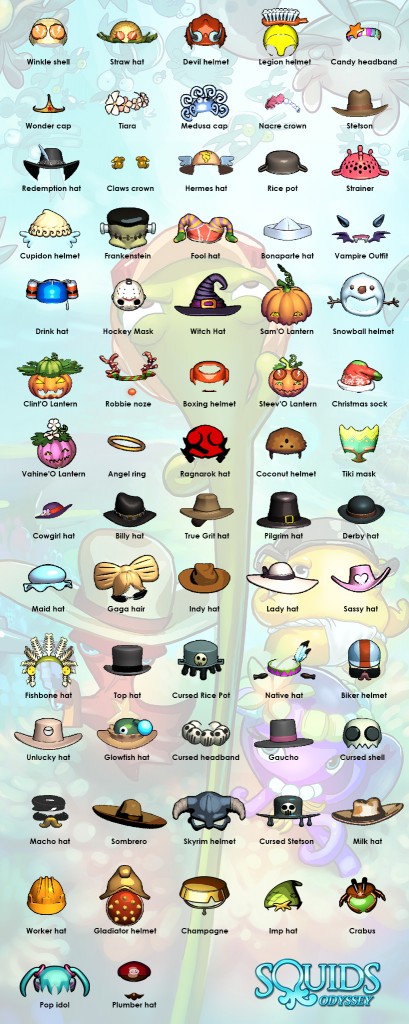
That’s why I came with the « transfer power » design idea. As soon as you got a new helmet, its bonus stats would transfer automatically to the Squid giving you the helmet’s power, but also letting you enjoy the customization aspects as you liked. This way, we’d go the Pokemon route: « catch’em all ». You were enticed to collect all helmets for empowerment and free to customize your Squid as you pleased, while in a classic RPG you don’t care about the wooden stick anymore once you have the diamond sword.
The design kinda worked, but we realized during the first playtest that there was a problem with the implementation: players didn’t realize that the helmets gave stats, and how much they gave. They would find the helmet, equip it, and the stats would transfer automatically. We skipped the crucial phase of visualizing the character’s empowerment so people thought helmets were only visual accessories.
To fix this, we added a completely unnecessary button: “Transfer Power”. When selecting a new helmet, you’d be able to actively tap “Transfer Power”. You’d see the bonus stats being transferred and your Squid would do a little victory dance. This changed how people perceived the helmets and was a more active way of getting the bonuses than a simple automated animation.
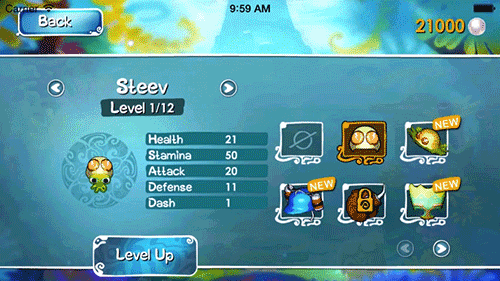
Between the initial idea of merging “weapons and customization” to the final helmet “transfer power” design, seven months passed. Not all this time was focused on this part of the design, of course, but it’s important to realize that a game is built from lots of little ideas that get crafted to parts of the UI, the controls, the animations, and the sounds. Time is key in the conception process. A game is the sum of its features growing over time, side by side but independently, like a tree growing its leaves.
When SQUIDS released, we found that players appreciated this original and unconventional way of handling weapons and customization. Some were immediately enthusiastic, while others mentioned that they found it weird at first, but loved it in the end.
Here is one of many quotes from players about this part of the system:
Player syntheticvoid  on TouchArcade’s forums:
You flick squids around, collect pearls, fight enemies, level up, equip, TRANSFER POWER FROM ITEMS TO YOUR CHARACTERS (friggin sweet mechanic!) – meaning once you buy an item, you can give it’s power to your character, then unequip it, and keep all the perks of that item… =oD
Although it’s not planned at the moment, I often think about designing a brand new SQUIDS game. It would be a massive reboot, a more tactical and deeper game. But for sure I’d keep the transfer power system.
Follow us @thegamebakers / @EmericThoa
We are very proud to see our own little Combo Crew in the new Humble Mobile Bundle, along some other great games like Duet, Eliss Infinity or Threes! The Humble Bundle version has new skins and new moves for Parker, Dolph and Gina! It’s time to kick Mr Boss’ ass once again!
Last part of our Squids adventure on Nintendo platforms: SQUIDS Odyssey is now available on the Nintendo eShop on 3DS. Our tactical RPG SQUIDS Odyssey for Nintendo 3DS includes all the same content as on Wii U, with gorgeous artwork thanks to a 3D-layered effect that shows off the Squids’ lush kingdom like never before. If you knew our previous Squids games, SQUIDS Odyssey is the ultimate SQUIDS compilation. It includes all content previously released, with tons of improvement (Pro Mode on the whole game!), a new chapter that continues the adventure in the kingdom of Wakame, a new Squid warrior and new helmets. But for the fans the most exciting will probably be the awesome controls with the pad, especially for those of you who love Scouts! Get it on 3DS here:
And on Wii U here:
And the trailer: Full press release below – – – – – – SQUIDS Odyssey Tactical Role-Playing Game Splashes onto Nintendo 3DS as a Nintendo eShop Download Save an underwater kingdom under siege in this quirky turn-based RPG MONTPELIER, France – July 3, 2014 – Following last month’s release on Wii U™, The Game Bakers’ popular SQUIDS franchise is now on Nintendo 3DS™ in SQUIDS Odyssey, a tactical RPG available for download in the Nintendo eShop. Designed specifically for handheld devices, SQUIDS Odyssey has casual combat with quick levels that can easily be enjoyed on the go, alongside an epic adventure storyline reminiscent of old-school JRPGs. When a mysterious black ooze seeps into the sea and disturbs the Squids’ peaceful kingdom, a scrappy shoal of heroes must fight back. During turn-based combat against ooze-infected crab and shrimp, the Squids’ springy tentacles become their best weapons: stretch them with your finger or the stylus, aim, and release to shoot your Squid toward its target. Four hero classes, stat-boosting helmets, and power-ups add a strategic element to the role-playing gameplay. SQUIDS Odyssey for Nintendo 3DS includes all the same content as on Wii U, with gorgeous artwork thanks to a 3D-layered effect that shows off the Squids’ lush kingdom like never before. Game features include:
In their positive review of the Wii U version, The Official Nintendo Magazine called SQUIDS Odyssey “difficult, but charming … a fun and unique, turn-based action game that’s worth spending a few squid on.” NintendoLife praised its “beautiful world and a good sense of humour,” and Nintendo World Report concluded, “In terms of Nintendo eShop titles, you won’t find many others that offer the long hours of gameplay that SQUIDS Odyssey provides.” The Game Bakers’ SQUIDS games have had more than two million downloads since their 2011 debut on mobile. As the franchise’s first appearance on consoles, SQUIDS Odyssey is the ultimate SQUIDS compilation that includes all content previously released, with tons of improvement and tweaks. Content exclusive to SQUIDS Odyssey includes a new campaign that continues the adventure in the never-before-seen kingdom of Wakame, a new Squid warrior named Oktoku, and four new helmets. SQUIDS Odyssey can be downloaded for 12.99€ / $14.99 (or equivalent in local currency) from the Nintendo eShop. For more game details, visit:
About SQUIDS Since its first mobile release in 2011, SQUIDS has become a globally recognized brand with more than two million game downloads to date. A digital comic book series is underway from APE Entertainment and a children’s television series is in early production. Learn more about SQUIDS on Facebook: http://www.facebook.com/SquidsTheGame SQUIDS Odyssey press assets: https://www.thegamebakers.com/vip About The Game Bakers An independent video game studio founded by industry veterans, The Game Bakers make games like they cook food: with a lot of care and a lot of love. After making a name for themselves with two SQUIDS RPGs and the brawler Combo Crew on mobile devices, the studio is turning their focus to console development starting with SQUIDS Odyssey for Wii U™ and Nintendo 3DS™. They are also working on an unannounced game to be released in 2014 alongside a major motion picture. To learn more, visit the company’s website at https://www.thegamebakers.com. Nintendo 3DS and Wii U are trademarks of Nintendo. © 2012 Nintendo.
Overview: this is a tool that helps exporting screenshots with localized text in all the different resolutions required by the Apple App Store and Google Play.
If you are a mobile game developer and have published some apps, you probably have prepared screenshots for the different stores, in varied resolutions, and maybe different languages.
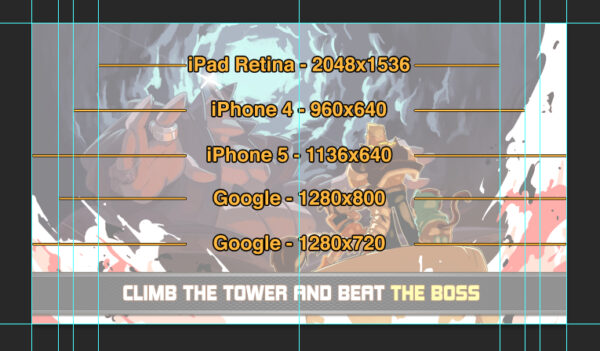
For Squids and Combo Crew, we published the game on the App Store and Google Play. The App Store is 5 screenshots of 3 different resolutions (iPhone 4, iPhone 5, iPad) and Google Play has also 5 screenshots of 2 resolutions that are different from the iOS ones (7 and 10 inches). We also have localized the game in over 8 languages and we had some text on the screenshots, that we wanted localized as well. That makes a total of 5 x 5 x 8 = 200 screenshots to export manually.
It’s ok, it’s an hour of grunt work for sure, but anyone can do it. But when for some reason you want to update something, a text or a picture, that’s another round of manual exports and that’ll become a bit annoying.
We had a very resourceful intern (thanks again Hannes!) who wrote a handy photoshop script that will export all the screenshots for all resolutions from a well set up photoshop file. It’ll save you time for the initial export, and if you have to update something later on, you’ll just have to update the picture or the text once and watch the script do the rest for you.
Here is how it work:
Note: there are two scripts, one for exporting in JPG and one in PNG. I recommend using the JPG one for the stores, as the files will be lighter and upload faster.
– HowTo is just a reminder of how the script works.
– Sizes are just reminders of the different resolutions.
– Screen1.jpg, Screen2.jpg… are the folders with your 5 screenshots for the App Store and Google Play.

Note that the file is 2726×1536 in size. That’s the iPad retina resolution with the iPhone 5’s ratio. If you optimize for the iPad retina you probably already do your UI and full screen elements with this in mind. If you don’t have 2726 wide screenshot, you can always resize the file to a 1280 or 1136 width after having done the iPad retina ones.
– Replace the screenshots with yours.
– Replace the text background, or delete it if you don’t need it.
– Enter your texts in the “txt” folder. The layer names will be used in the filenames later on.
Attention: make sure you don’t go further than the boundaries so that the text isn’t cropped on iPad.
– Once this is done, select the screenshot you want to export (a visible layer must be selected for the script to work).
– Click on ExportScreenshotsJPG.jsx. A popup will ask you to confirm you want to launch this script. Go back to photoshop and go make yourself a coffee while it works.
– All the files are going to appear in the “out” folder.
Here an example with only one screenshot and two languages:
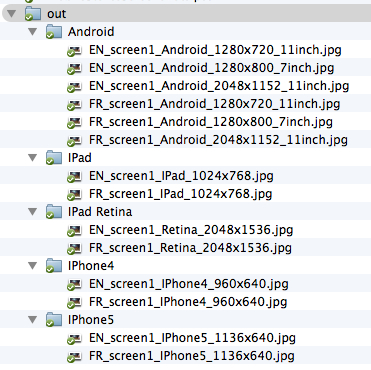
Hopefully this will save you some time like it did for us!
That’s it, our Squids are moving onto Nintendo platforms. SQUIDS Odyssey is now available on the Nintendo eShop on Wii U. Our tactical RPG with an epic adventure storyline, crisp cartoon graphics, and strategic, turn-based gameplay feels well at home in the Nintendo line up. If you knew our previous Squids games, SQUIDS Odyssey is the ultimate SQUIDS compilation. It includes all content previously released, with tons of improvement (Pro Mode on the whole game!), a new chapter that continues the adventure in the kingdom of Wakame, a new Squid warrior and new helmets. But for the fans the most exciting will probably be the awesome controls with the pad, especially for those of you who love Scouts! Get it on Wii U here:
Coming soon on Nintendo 3DS!
And the trailer:
Full press release below
– – – – – –
SQUIDS Odyssey Tactical RPG Now Available in the Nintendo eShop on Wii U
The Game Bakers’ Squid heroes make console debut in an epic underwater adventure
MONTPELIER, France – May 22, 2014 – Independent developer The Game Bakers have just pulled their latest delicacy from the oven, and SQUIDS are on the menu! Gamers hungry for a tactical RPG with an epic adventure storyline, crisp cartoon graphics, and strategic, turn-based gameplay can now download SQUIDS Odyssey in the Nintendo eShop on the Wii U™ system. The game will also release for the Nintendo 3DS™ hand-held system in the near future. In SQUIDS Odyssey, a murky black ooze is seeping into the water, turning crustaceans into cranky monsters. With their peaceful realm under siege, a scrappy shoal of Squid heroes has no other choice but to fight back. During turn-based battles against their oily enemies, these unlikely heroes’ squishy bodies serve as their best weapons: simply stretch a Squid’s tentacles, aim, then let go to shoot it across the battlefield. Four hero classes, stat-boosting helmets, and power-ups add a strategic element to the role-playing gameplay. To control the Squids, players can use the Left Stick to aim and shoot, or go “hands on” to stretch the Squids’ tentacles on the Wii U™ GamePad touch screen. The game can be enjoyed in high definition on the TV, or in Off-TV-Mode played exclusively on the GamePad. SQUIDS Odyssey Features:
The Game Bakers’ SQUIDS games have had more than two million downloads since their 2011 debut on mobile. As the franchise’s first appearance on consoles, SQUIDS Odyssey is the ultimate SQUIDS compilation that includes all content previously released, with tons of improvement and tweaks. Content exclusive to SQUIDS Odyssey includes a new chapter that continues the adventure in the never-before-seen kingdom of Wakame, a new Squid warrior named Oktoku, and four new helmets. SQUIDS Odyssey can be downloaded for 12.99€ / $14.99 (or equivalent in local currency) from the Nintendo eShop. For more game details, visit:
About SQUIDS Since its first mobile release in 2011, SQUIDS has become a globally recognized brand with more than two million game downloads to date. A digital comic book series is underway from APE Entertainment and a children’s television series is in early production. Learn more about SQUIDS on Facebook: http://www.facebook.com/SquidsTheGame SQUIDS Odyssey press assets: https://www.thegamebakers.com/vip About The Game Bakers An independent video game studio founded by industry veterans, The Game Bakers make games like they cook food: with a lot of care and a lot of love. After making a name for themselves with two SQUIDS RPGs and the brawler Combo Crew on mobile devices, the studio is turning their focus to console development starting with SQUIDS Odyssey for Wii U™ and Nintendo 3DS™. They are also working on an unannounced game to be released in 2014 alongside a major motion picture. To learn more, visit the company’s website at https://www.thegamebakers.com. Nintendo 3DS and Wii U are trademarks of Nintendo. © 2012 Nintendo. Contact Emily Morganti Public Relations Consultant thegamebakers@emilymorganti.com
© Copyright The Game Bakers